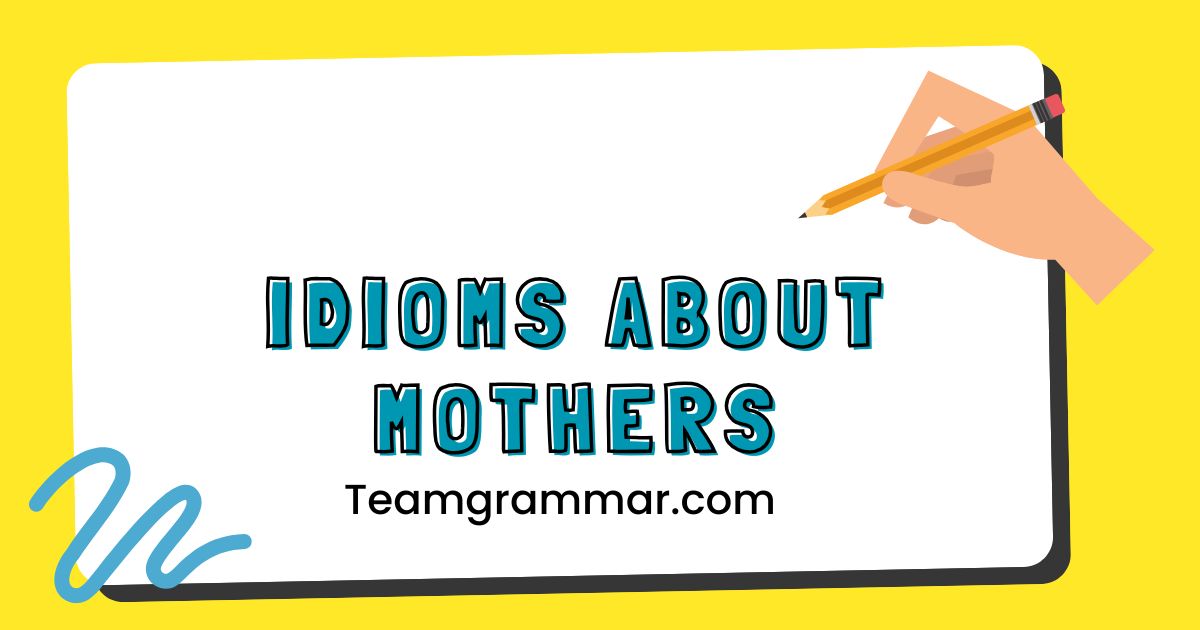Motherhood in Words: Mastering Idioms About Mothers in English
Idioms are colorful expressions that add depth and nuance to the English language. Understanding idioms about mothers is crucial for grasping the cultural significance and emotional weight associated with motherhood.
This article breaks down common idioms related to mothers, explores their meanings, origins, and usage, and provides practical exercises to help you master them. This guide will benefit English language learners, writers, and anyone interested in enriching their vocabulary and understanding cultural nuances.
By the end of this comprehensive guide, you’ll not only understand the meaning of these idioms but also know how to use them correctly in various contexts, enhancing your communication skills and cultural awareness.
Table of Contents
- Definition of Idioms About Mothers
- Structural Breakdown of Idioms
- Types and Categories of Idioms About Mothers
- Examples of Idioms About Mothers
- Usage Rules for Idioms About Mothers
- Common Mistakes with Idioms About Mothers
- Practice Exercises
- Advanced Topics in Idioms About Mothers
- FAQ About Idioms About Mothers
- Conclusion
Definition of Idioms About Mothers
An idiom is a phrase or expression whose meaning cannot be understood from the literal meanings of its individual words. Instead, the phrase has a figurative meaning that is unique to the language and culture in which it is used.
Idioms about mothers specifically revolve around the roles, characteristics, and experiences associated with motherhood.
These idioms often reflect cultural values, societal expectations, and emotional connections related to mothers and their children. Understanding these idioms requires grasping the underlying cultural context and figurative language used.
Classification of Idioms
Idioms can be classified based on their syntactic structure or their thematic content. Syntactically, idioms can be phrasal verbs (e.g., “mother hen”), prepositional phrases (e.g., “in a motherly way”), or clauses (e.g., “like mother, like daughter”).
Thematically, they can be categorized based on the specific aspect of motherhood they represent, such as nurturing, protection, or influence.
Function of Idioms
The primary function of idioms is to add color, expressiveness, and cultural depth to communication. They can convey emotions, attitudes, and perspectives in a concise and impactful way.
In the context of motherhood, idioms can evoke feelings of warmth, care, concern, or even humor, depending on the specific idiom and the context in which it is used.
Contexts of Use
Idioms about mothers are used in a wide range of contexts, from everyday conversations to literature, movies, and other forms of media. They are commonly found in discussions about family relationships, parenting, personal growth, and cultural norms.
The specific context often determines the appropriateness and impact of using a particular idiom.
Structural Breakdown of Idioms
The structure of idioms can vary, but they typically consist of a combination of words that, when taken together, have a meaning different from the sum of their parts. Understanding the structural elements of idioms can help in recognizing and interpreting them correctly.
Components of Idioms
Most idioms consist of a noun, verb, adjective, or prepositional phrase. These components combine to create a figurative meaning.
For example, in the idiom “mother hen,” the noun “mother” is combined with the noun “hen” to describe someone who is overly protective.
Common Patterns in Idioms
Several common patterns appear in idioms about mothers. These include comparisons (e.g., “as nurturing as a mother”), metaphors (e.g., “a mother’s love is a guiding star”), and personifications (e.g., “mother nature”).
Recognizing these patterns can aid in understanding the underlying meaning of the idiom.
Transformations and Variations
Some idioms can be transformed or varied slightly without losing their core meaning. For example, “like mother, like daughter” can be varied to “like father, like son” to apply to male family members.
However, it’s important to be aware that not all idioms can be transformed, and some variations may alter the meaning.
Types and Categories of Idioms About Mothers
Idioms about mothers can be categorized based on the specific aspect of motherhood they represent. Here are some common categories:
Idioms Related to Nurturing and Care
These idioms emphasize the caring and nurturing aspects of motherhood. They often describe mothers as providers, protectors, and sources of comfort.
Idioms Related to Protection and Guidance
These idioms highlight the protective role of mothers and their guidance in shaping their children’s lives. They often convey a sense of security and support.
Idioms Related to Influence and Heritage
These idioms focus on the influence mothers have on their children’s character, values, and behavior. They often reflect the idea that children inherit traits from their mothers.
Idioms Related to Strength and Resilience
These idioms celebrate the strength and resilience of mothers in overcoming challenges and supporting their families. They often portray mothers as pillars of strength and unwavering support.
Examples of Idioms About Mothers
Understanding idioms requires seeing them in context. The following tables provide examples of idioms about mothers, categorized by their meaning and usage.
Table 1: Idioms Related to Nurturing and Care
This table presents a variety of idioms that highlight the nurturing and caring aspects of motherhood. Each idiom is accompanied by its meaning and example sentence to illustrate its usage in context.
| Idiom | Meaning | Example Sentence |
|---|---|---|
| Mother hen | Someone who is overly protective and watchful. | She’s such a mother hen; she always worries about her children, even when they’re grown up. |
| A shoulder to cry on | Someone who offers comfort and support during difficult times. | After losing her job, her mother was a shoulder to cry on. |
| Wear many hats | To have many different roles or responsibilities. | As a working mother, she has to wear many hats: cook, driver, and caregiver. |
| Home is where the heart is | The place where you feel most comfortable and loved. | Even though she travels a lot, her mother’s house is where her heart is. |
| As warm as a mother’s love | Describes something that is comforting and affectionate. | The blanket felt as warm as a mother’s love on a cold night. |
| Tender loving care (TLC) | Gentle and affectionate care. | The injured bird needed some tender loving care to recover. |
| To take under one’s wing | To protect or guide someone. | The experienced teacher took the new student under her wing. |
| To mother someone | To care for someone in a maternal way. | She always mothers her younger brother, making sure he’s okay. |
| To spoon-feed | To give someone too much help or information. | The teacher refused to spoon-feed the students the answers. |
| To nurse someone back to health | To care for someone until they recover from illness. | His mother nursed him back to health after his surgery. |
| To be a comfort | To provide solace or relief. | Her presence was a great comfort to him during his grief. |
| To make a house a home | To create a warm and welcoming environment. | She worked hard to make the house a home for her family. |
| To provide for | To supply with necessities. | She worked two jobs to provide for her children. |
| To nurture growth | To help someone develop and thrive. | A good teacher nurtures the growth of their students. |
| To foster development | To encourage the progress of something. | The program aims to foster the development of young artists. |
| To tend to | To take care of someone or something. | She tends to her garden every morning. |
| To look after | To take care of someone or something. | She looks after her elderly mother. |
| To keep an eye on | To watch someone or something carefully. | She asked her neighbor to keep an eye on her house while she was away. |
| To be a good influence | To have a positive effect on someone’s behavior or development. | Her mother was a good influence on her, always encouraging her to pursue her dreams. |
| To shower with affection | To give someone a lot of love and attention. | She showered her grandchildren with affection whenever they visited. |
| To be a pillar of support | To be a strong and reliable source of help and encouragement. | Her mother was a pillar of support during her difficult times. |
| To give unconditional love | To love someone without any limitations or conditions. | A mother’s love is often described as unconditional. |
| To be a safe haven | To be a place of safety and refuge. | Her mother’s home was always a safe haven for her. |
| To offer a listening ear | To be willing to listen to someone’s problems and concerns. | She always offered a listening ear to her friends and family. |
| To be a source of strength | To provide someone with the courage and resilience they need to overcome challenges. | Her mother was a source of strength for her during her illness. |
| To be a guiding light | To provide someone with direction and inspiration. | Her mother was a guiding light in her life, helping her to make important decisions. |
| To be a constant presence | To be someone who is always there for support and companionship. | Her mother was a constant presence in her life, always there to offer help and advice. |
Table 2: Idioms Related to Protection and Guidance
This table showcases idioms focusing on the protective and guiding roles of mothers. These idioms often reflect the idea of mothers as guardians and mentors.
| Idiom | Meaning | Example Sentence |
|---|---|---|
| Under one’s wing | Under someone’s protection or guidance. | The experienced manager took the new employee under her wing. |
| To run to one’s mother | To seek comfort or help from one’s mother. | Whenever she had a problem, she would run to her mother for advice. |
| To be tied to one’s mother’s apron strings | To be overly dependent on one’s mother. | He was so tied to his mother’s apron strings that he couldn’t make decisions on his own. |
| To keep someone out of harm’s way | To protect someone from danger. | She always tried to keep her children out of harm’s way. |
| To watch over someone | To protect or guard someone. | She promised to watch over her younger sister while their parents were away. |
| To steer someone in the right direction | To guide someone towards making good choices. | Her mother always steered her in the right direction. |
| To look out for someone | To take care of someone and make sure they are safe. | She always looked out for her younger siblings. |
| To be a guardian angel | To be someone who protects and guides someone else. | Her mother was her guardian angel, always watching over her. |
| To be a guiding hand | To provide guidance and support. | Her mother was a guiding hand in her life, helping her to make important decisions. |
| To be a beacon of hope | To provide hope and inspiration. | Her mother was a beacon of hope during her difficult times. |
| To shield from harm | To protect someone from danger or unpleasant experiences. | She tried to shield her children from the harsh realities of the world. |
| To stand by someone | To support someone during difficult times. | Her mother always stood by her, no matter what. |
| To have someone’s back | To support and protect someone. | She knew she could always count on her mother to have her back. |
| To be there for someone | To be available to support someone. | Her mother was always there for her, no matter what. |
| To be a rock | To be a strong and dependable source of support. | Her mother was her rock, always there to lean on. |
| To offer a helping hand | To provide assistance or support. | Her mother always offered a helping hand whenever she needed it. |
| To be a source of inspiration | To provide someone with the motivation and encouragement they need to succeed. | Her mother was a source of inspiration, always pushing her to achieve her goals. |
| To be a role model | To be someone whose behavior and values serve as an example for others. | Her mother was a role model, teaching her the importance of hard work and integrity. |
| To set a good example | To behave in a way that others can admire and imitate. | She tried to set a good example for her children. |
| To instill values | To teach someone important principles and beliefs. | Her mother instilled in her the values of honesty and kindness. |
| To shape character | To influence the development of someone’s personality and moral qualities. | Her mother played a significant role in shaping her character. |
| To mold the future | To influence the course of someone’s life. | She hoped to mold her children’s future by providing them with a good education. |
| To nurture potential | To help someone develop their talents and abilities. | Her mother always nurtured her potential. |
| To guide the way | To show someone the right path to follow. | Her mother guided her way through life’s challenges. |
| To light the path | To provide clarity and direction. | Her mother’s wisdom lit the path for her. |
| To pave the way | To make it easier for someone to achieve something. | Her mother paved the way for her success by providing her with opportunities. |
| To clear the obstacles | To remove barriers that prevent someone from achieving their goals. | She tried to clear the obstacles in her children’s path. |
Table 3: Idioms Related to Influence and Heritage
This table presents a set of idioms that emphasize the influence mothers have on their children and the concept of inherited traits and characteristics.
| Idiom | Meaning | Example Sentence |
|---|---|---|
| Like mother, like daughter | Daughters often share similar traits or behaviors with their mothers. | Both are talented artists; like mother, like daughter. |
| The apple doesn’t fall far from the tree | Children often resemble their parents in character or behavior. | He’s a talented musician, just like his father; the apple doesn’t fall far from the tree. |
| To take after someone | To resemble a parent or relative in appearance or character. | She takes after her mother in her love for cooking. |
| To be cut from the same cloth | To be very similar in character or behavior. | They are both ambitious and hardworking; they are cut from the same cloth. |
| To have in one’s blood | To have a natural talent or inclination for something. | She has music in her blood; she comes from a family of musicians. |
| To follow in someone’s footsteps | To do the same job or activity as someone else. | He followed in his father’s footsteps and became a doctor. |
| To inherit traits | To receive characteristics or qualities from one’s parents. | She inherited her artistic talent from her mother. |
| To carry on the legacy | To continue the work or traditions of someone else. | She is determined to carry on her mother’s legacy of community service. |
| To be a chip off the old block | To be very similar to one’s parent in character or behavior. | He’s a chip off the old block, just as stubborn as his father. |
| To have the same spirit | To share the same values and attitudes as someone else. | She has the same adventurous spirit as her mother. |
| To share a bond | To have a strong connection with someone. | They share a strong bond as mother and daughter. |
| To have a kindred spirit | To have a similar temperament or outlook on life. | She found a kindred spirit in her mother. |
| To be connected at the heart | To have a deep emotional connection with someone. | They are connected at the heart, despite the distance between them. |
| To have a lasting impact | To have a significant and enduring effect on someone’s life. | Her mother had a lasting impact on her, shaping her values and beliefs. |
| To leave a mark | To have a noticeable effect or influence on someone or something. | Her mother left a mark on her life, teaching her the importance of kindness and compassion. |
| To pass down traditions | To transmit customs and practices from one generation to the next. | They pass down traditions from mother to daughter. |
| To instill values | To teach someone important principles and beliefs. | Her mother instilled in her the values of honesty and integrity. |
| To shape character | To influence the development of someone’s personality and moral qualities. | Her mother played a significant role in shaping her character. |
| To mold the future | To influence the course of someone’s life. | She hopes to mold her children’s future by providing them with a good education. |
| To nurture potential | To help someone develop their talents and abilities. | Her mother always nurtured her potential. |
| To guide the way | To show someone the right path to follow. | Her mother guided her way through life’s challenges. |
| To light the path | To provide clarity and direction. | Her mother’s wisdom lit the path for her. |
| To pave the way | To make it easier for someone to achieve something. | Her mother paved the way for her success by providing her with opportunities. |
| A mother’s touch | The unique and special care and affection that a mother provides. | The meal wasn’t just nourishing; it had that special mother’s touch. |
| A mother’s wisdom | The knowledge, insight, and guidance that a mother imparts to her children. | She often sought her mother’s wisdom when faced with difficult decisions. |
| A mother’s intuition | The instinctual understanding and insight that a mother has about her children. | She trusted her mother’s intuition when it came to making important decisions about her children. |
Table 4: Idioms Related to Strength and Resilience
This table provides idioms that celebrate the strength, resilience, and unwavering support that mothers provide, especially during challenging times.
| Idiom | Meaning | Example Sentence |
|---|---|---|
| A pillar of strength | Someone who provides unwavering support and stability. | During the crisis, she was a pillar of strength for her family. |
| To weather the storm | To survive a difficult situation. | Together, they weathered the storm and emerged stronger. |
| To stand tall | To remain confident and resilient in the face of adversity. | She stood tall despite the challenges she faced. |
| To rise above | To overcome difficulties and achieve success. | She rose above her difficult circumstances and became a successful entrepreneur. |
| To keep one’s head above water | To barely manage to survive or cope with difficulties. | She worked tirelessly to keep her head above water. |
| To carry the weight of the world | To bear a heavy burden of responsibility. | She felt like she was carrying the weight of the world on her shoulders. |
| To be a rock | To be a strong and dependable source of support. | Her mother was her rock, always there to lean on. |
| To be a source of comfort | To provide solace and relief during difficult times. | Her mother was a source of comfort when she was feeling down. |
| To be a beacon of hope | To provide hope and inspiration. | Her mother was a beacon of hope during her difficult times. |
| To offer a shoulder to cry on | To provide comfort and support to someone who is upset. | Her mother always offered a shoulder to cry on when she was feeling sad. |
| To lend an ear | To listen attentively to someone’s problems or concerns. | Her mother always lends an ear when she needs to talk. |
| To be a safe haven | To provide a place of safety and refuge. | Her mother’s home was always a safe haven for her. |
| To be a refuge | To provide protection or shelter from danger or distress. | Her mother was her refuge during difficult times. |
| To be a sanctuary | To provide a place of peace and tranquility. | Her mother was her sanctuary, a place where she could always find peace. |
| To be a fortress | To provide strong protection and security. | Her mother was her fortress, protecting her from harm. |
| To be unshakeable | To be strong and unwavering in the face of adversity. | Her mother was unshakeable, always standing firm in her beliefs. |
| To be resilient | To be able to recover quickly from difficulties. | Her mother was resilient, always bouncing back from setbacks. |
| To be steadfast | To be firm and unwavering in one’s commitment. | Her mother was steadfast in her support for her children. |
| To be unwavering | To be firm and resolute. | Her mother’s love was unwavering, always there for her. |
| To be a constant | To be reliable and dependable. | Her mother was a constant in her life, always there to offer support and guidance. |
| To be a guiding light | To provide direction and inspiration. | Her mother was a guiding light, helping her to navigate life’s challenges. |
| To be a mentor | To provide guidance and advice to someone less experienced. | Her mother was her mentor, helping her to develop her skills and talents. |
| To be an inspiration | To provide someone with the motivation and encouragement they need to succeed. | Her mother was an inspiration, showing her the importance of hard work and perseverance. |
| To be a role model | To be someone whose behavior and values serve as an example for others. | Her mother was a role model, teaching her the importance of honesty and integrity. |
| To set an example | To behave in a way that others can admire and imitate. | Her mother set an example of kindness and compassion. |
Usage Rules for Idioms About Mothers
Using idioms correctly requires understanding their specific meanings and contexts. Here are some rules to follow when using idioms about mothers:
Consider the Context
Ensure that the idiom is appropriate for the specific context and audience. Some idioms may be too informal or culturally specific for certain situations.
Understand the Meaning
Be sure you fully understand the figurative meaning of the idiom before using it. Misusing an idiom can lead to confusion or miscommunication.
Maintain Grammatical Correctness
Even though idioms are figurative, they should still be used in grammatically correct sentences. Pay attention to verb tenses, subject-verb agreement, and other grammatical rules.
Be Aware of Variations
Some idioms have variations, but not all idioms can be changed. Be cautious when altering an idiom, as it may change the meaning.
Common Mistakes with Idioms About Mothers
Learners often make mistakes when using idioms. Here are some common errors and how to avoid them:
Table 5: Common Mistakes with Idioms
This table highlights common mistakes made when using idioms about mothers and provides corrected examples to illustrate the proper usage.
| Incorrect | Correct | Explanation |
|---|---|---|
| She is a real chicken mother. | She is a real mother hen. | “Mother hen” is the correct idiom for someone who is overly protective. |
| He always runs for his mother. | He always runs to his mother. | The correct preposition is “to,” not “for.” |
| They are cut by the same cloth. | They are cut from the same cloth. | The correct preposition is “from,” not “by.” |
| She takes after her mother in her looks. | She takes after her mother. | “Takes after” already implies resemblance; no need to specify “in her looks.” |
| She is a pillar from strength. | She is a pillar of strength. | The correct preposition is “of,” not “from.” |
| She is under her mother’s wing’s. | She is under her mother’s wing. | The idiom is “under her mother’s wing,” not “wing’s.” |
| He is tied with his mother’s apron strings. | He is tied to his mother’s apron strings. | The correct preposition is “to,” not “with.” |
| She has music at her blood. | She has music in her blood. | The correct preposition is “in,” not “at.” |
| The apple doesn’t fall far of the tree. | The apple doesn’t fall far from the tree. | The correct preposition is “from,” not “of.” |
| He is a piece of the old block. | He is a chip off the old block. | The correct idiom is “a chip off the old block.” |
Practice Exercises
Test your understanding of idioms about mothers with these practice exercises.
Exercise 1: Fill in the Blanks
Complete the following sentences with the correct idiom from the list below.
Idiom List: mother hen, shoulder to cry on, under her wing, like mother like daughter, apple doesn’t fall far from the tree
Table 6: Practice Exercise 1
| Question | Answer |
|---|---|
| 1. She’s such a _______; she worries about her kids constantly. | mother hen |
| 2. Whenever I’m upset, my mom is always a _______. | shoulder to cry on |
| 3. The experienced manager took the new employee _______. | under her wing |
| 4. They both love to cook; _______. | like mother like daughter |
| 5. He’s a talented musician, just like his dad; the _______. | apple doesn’t fall far from the tree |
| 6. She is always there for her children, acting like a true _______. | mother hen |
| 7. After a bad day, I know I can always count on my mom; she’s my _______. | shoulder to cry on |
| 8. The senior mentor decided to take the new recruit _______. | under her wing |
| 9. Both are excellent athletes; _______. | like mother like daughter |
| 10. He’s known for his quick temper, just like his father; the _______. | apple doesn’t fall far from the tree |
Exercise 2: Multiple Choice
Choose the correct meaning for each idiom in the following sentences.
Table 7: Practice Exercise 2
| Question | Answer | Choices |
|---|---|---|
| 1. She wears many hats as a working mother. What does “wears many hats” mean? | Has many responsibilities | a) Wears a lot of hats b) Has many responsibilities c) Is a fashion icon |
| 2. He’s always running to his mother for help. What does “running to his mother” mean? | Seeking comfort or support | a) Literally running b) Seeking comfort or support c) Exercising |
| 3. Her mother is a pillar of strength for her. What does “pillar of strength” mean? | A source of unwavering support | a) A physical pillar b) A source of unwavering support c) A strong building |
| 4. She takes after her mother in her kindness. What does “takes after” mean? | Resembles | a) Chases after b) Resembles c) Imitates |
| 5. The apple doesn’t fall far from the tree. What does this idiom mean? | Children resemble their parents | a) Apples fall near trees b) Children
resemble their parents c) Trees bear fruit |
Advanced Topics in Idioms About Mothers
For those looking to delve deeper, here are some advanced topics related to idioms about mothers:
Cultural Variations in Idioms
Idioms about mothers can vary significantly across cultures. Different societies may have unique expressions that reflect their specific values and traditions related to motherhood.
Exploring these cultural variations can provide insights into diverse perspectives on motherhood.
Historical Evolution of Idioms
The meanings and usage of idioms can evolve over time. Some idioms may have originated in specific historical contexts and have changed their connotations or applications over the years.
Studying the historical evolution of idioms about mothers can reveal shifts in cultural attitudes and societal norms.
Idioms in Literature and Media
Idioms are frequently used in literature, movies, and other forms of media to add depth and nuance to storytelling. Analyzing how idioms about mothers are used in these contexts can enhance understanding of the characters, themes, and cultural messages being conveyed.
FAQ About Idioms About Mothers
Here are some frequently asked questions about idioms related to mothers:
What is the difference between an idiom and a proverb?
An idiom is a phrase with a figurative meaning that differs from its literal meaning (e.g., “mother hen”). A proverb is a short, well-known saying that expresses a general truth or piece of advice (e.g., “a mother’s love never ends”).
How can I improve my understanding of idioms?
To improve your understanding of idioms, read widely, pay attention to context, ask for clarification when you encounter unfamiliar idioms, and practice using them in your own speech and writing.
Are idioms about mothers universal?
While some themes related to motherhood are universal, the specific idioms used to express these themes can vary significantly across cultures. It’s important to be aware of cultural differences when interpreting and using idioms.
Can I create my own idioms about mothers?
While it’s possible to create new expressions, idioms typically gain acceptance and usage over time through widespread adoption. If you create a phrase that resonates with others and becomes commonly used, it may eventually become an idiom.
Why is it important to learn idioms?
Learning idioms enhances your understanding of a language’s cultural nuances and improves your ability to communicate effectively. Idioms add color, expressiveness, and depth to your speech and writing, making you a more proficient and engaging communicator.
Conclusion
Mastering idioms about mothers enriches your understanding of the English language and provides valuable insights into cultural perspectives on motherhood. By understanding the definitions, structures, types, and usage rules of these idioms, you can enhance your communication skills and cultural awareness.
Practice the exercises provided in this article to reinforce your learning and confidently use idioms about mothers in various contexts. Whether you are an English language learner, a writer, or simply someone interested in expanding your vocabulary, this guide equips you with the knowledge and skills to appreciate the depth and beauty of idioms about mothers.







